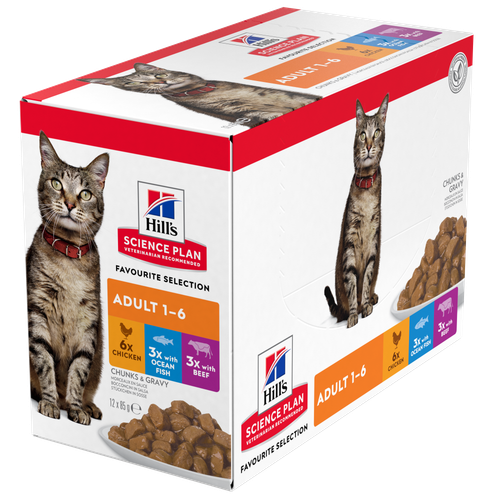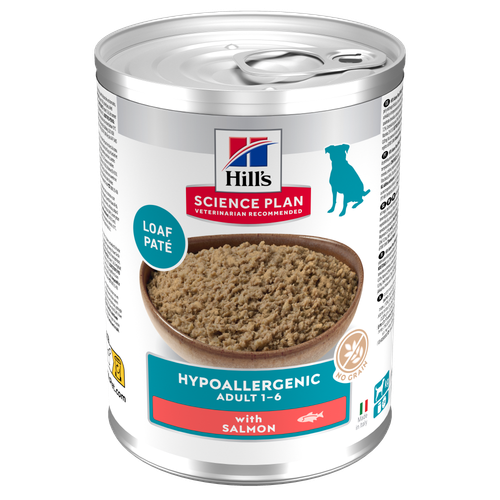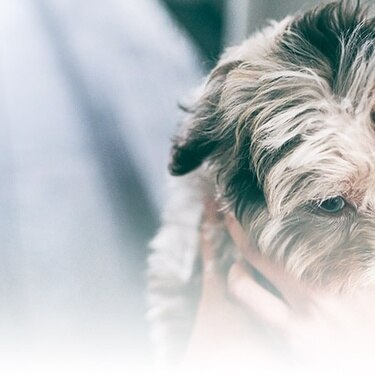
-
Find the right food for your petTake this quiz to see which food may be the best for your furry friend.Find the right food for your petTake this quiz to see which food may be the best for your furry friend.Featured productswith Chicken, with Beef
Hill's Science Plan Puppy Multipack Wet Dog Food with Chicken & Beef are complete premium pet foods for growing puppies from weaning until 1 year old and for pregnant and nursing dogs. Your puppy will love these deliciously smooth and savoury minced loaves, formulated for balanced nutrition and overall health.
Shop NowAdult Dog FoodHill's Science Plan Adult Multipack Wet Dog Food with Chicken, Beef & Turkey are complete premium pet foods for adult dogs from 1 year. Your dog will love these deliciously smooth and savoury minced loaves, formulated for balanced nutrition and overall health.
Shop Nowwith Chicken, with BeefHill's Science Plan Mature Adult Multipack Wet Dog Food with Chicken & Beef are complete premium pet foods for mature adult dogs from 7 years. Your dog will love these deliciously smooth and savoury minced loaves, formulated to deliver the appropriate amount of energy to support the needs of adult dogs.
Shop NowFeatured products Adult Wet Cat Food with Chicken
Adult Wet Cat Food with ChickenTender chunks in gravy for cats, with high-quality protein to maintain lean muscle. With vitamin E and omega-3s & -6s for healthy skin and balanced minerals to support healthy vital organs.
Shop Now with Ocean Fish, Chicken
with Ocean Fish, ChickenTender chicken chunks in gravy for cats, with L-carnitine and fewer calories for ideal weight management. Packed with high-quality protein, omega-6s, and vitamin E for shiny fur and healthy skin.
Shop Now Mature Adult Wet Cat Food with Chicken
Mature Adult Wet Cat Food with Chicken
Tender chicken chunks in gravy for mature adult cats. Made with easy-to-digest ingredients, high-quality protein for lean muscle maintenance and antioxidant vitamins C+E for optimal health.
Shop Now -
Dog
- Dog Tips & Articles
-
Health Category
- Weight
- Food & Environmental Sensitivities
- Urinary
- Digestive
- Joint
- Kidney
-
Life Stage
- Puppy Nutrition
- Adult Nutrition
- Senior Nutrition
Cat- Cat Tips & Articles
-
Health Category
- Weight
- Skin & Food Sensitivities
- Urinary
- Digestive
- Kidney
-
Life Stage
- Kitten Nutrition
- Adult Nutrition
Featured articles The Right Diet For Your Pet
The Right Diet For Your PetIn people, the right diet is very important. If you are eating the wrong way for your metabolism, activity level, age and lifestyle you could end up with health issues.
Read More The Incredible Science Behind Your Pet's Microbiome
The Incredible Science Behind Your Pet's MicrobiomeLearn what your pet's microbiome is, how it contributes to your pet's gut and overall health, and why nutrition is important in maintaining healthy microbiomes.
Read More Show some love with wet foods: a great choice for pets with health issues
Show some love with wet foods: a great choice for pets with health issuesShow some love with wet foods: a great choice for pets with health issues.
Read More -


Having a puppy in the family is an exciting time for everyone, but it can also come with new experiences and concerns for pet parents. For example, have you noticed that your puppy seems to have dry skin or flaky patches that look like dandruff? This might be particularly noticeable if your puppy is a dark colour, or you see the flakes where they’ve been lying on a dark bed.
Signs of dry skin in puppies
With any new arrival, we tend to be very sensitive and vigilant to the slightest issues. This is great because the most observant pet parents are the ones who will see when things aren’t quite right early on and get ahead of the game when it comes to treatment.
As you may imagine, the most obvious sign of dry skin in puppies is what looks like dandruff in the fur. It’s a good idea to get your puppy used to being gently handled from a young age. This way you can run your hands over their bodies and part the hair in a few places and check their skin a few times a week. You can also get them used to being handled for things like having their paws dried or their ears and teeth checked. If you do this from a young age, and in a positive way with rewards, it can really pay dividends later in life, and will help with vet examinations too.
In some puppies with short fur or dark fur, dandruff build-up may be very obvious. However, actually looking at the skin is necessary for medium- and long-haired dogs or those that are a very light colour.
You may find a build-up of flakes in some places more than others, like the neck or near the base of the tail. This could be just because they are the places that are harder to reach when a puppy is grooming.
You may also notice your puppy is scratching more than you were expecting them to. This is because a build-up of dry skin can be quite irritating and cause itchiness.


Tasty Tips
Causes of dry skin in puppies and what to do about it
There are two main reasons your puppy may have dry skin:
It’s normal for puppies. Puppies tend to have slightly drier skin than adult dogs because the sebaceous glands in their skin are still developing. These are the glands that secrete natural oils onto the skin and coat to help keep them hydrated and healthy. If your puppy isn’t scratching all the time and seems well otherwise, you could just try gently grooming them a few times a week. This will help remove the dead skin and also stimulate the glands producing the oils.
Parasites. Puppies can pick up parasites such as mites, lice or fleas from their mums and their environment. Some parasites cause intense itchiness, and the scratching that ensues will cause the flaky skin. Some parasites, called Cheyletiella, look like dandruff. In this case, if you look closely you may see it moving, hence its name “walking dandruff”! It’s important to note that if a member of your family is suffering from itchy skin at the same time as your puppy, then it could be a real possibility that Cheyletiella has spread from puppy to human or vice versa, so it’s in your best interest to check with a vet and also see your doctor.
Seeking help
Your puppy will hopefully be having regular trips to the vet for weighing and vaccinations and so on. If you’re not too concerned, just call ahead and ask for a check of the skin at your next visit. If your puppy seems irritated, is scratching a lot, or is losing hair and has balding patches or scabs, then a vet visit is definitely needed.
Also, talk to your vet about what to feed when you first get your puppy. Optimal nutrition is really important during growth and puppies of different sizes have different needs. Growing is hard work and if nutrition is below par, the skin and coat are often the first things to suffer. Feeding a high-quality, complete and balanced puppy food from the outset will get you and your puppy off to a flying head start.
Reviewed by Dr. Hein Meyer, DVM, PhD, Dipl-ECVIM-CA


One of our staff authors prepared this article for you
Related products
Hill's Science Plan Puppy Multipack Wet Dog Food with Chicken & Beef are complete premium pet foods for growing puppies from weaning until 1 year old and for pregnant and nursing dogs. Your puppy will love these deliciously smooth and savoury minced loaves, formulated for balanced nutrition and overall health.
Hill's Science Plan Mature Adult Multipack Wet Dog Food with Chicken & Beef are complete premium pet foods for mature adult dogs from 7 years. Your dog will love these deliciously smooth and savoury minced loaves, formulated to deliver the appropriate amount of energy to support the needs of adult dogs.

Hill's Science Plan Hypoallergenic Adult Wet Dog Food with Salmon is a complete premium pet food for all adult dogs from 1 year. This savoury tinned loaf is specially formulated for dogs with delicate skin and stomachs. It features a single novel animal protein source and is grain-free.
Hill's Science Plan Adult Multipack Wet Dog Food with Chicken, Beef & Turkey are complete premium pet foods for adult dogs from 1 year. Your dog will love these deliciously smooth and savoury minced loaves, formulated for balanced nutrition and overall health.
Related articles

Learn about the potential health risks of a raw diet for dogs and why they aren't the best option for your pup or you.

How, when and what to feed your new puppy is an important decision, learn more about the things to consider for feeding your puppy.

Many human foods are dangerous to dogs. Read about 5 of the worst toxic food offenders that can kill your dog - and how much it takes to hurt them.

Learn effective tips for feeding a dog that's a picky eater and ensure proper nutrition for a finicky eater. Discover tips for pet parents at Hill's Pet UK.

Put your dog on a diet without them knowing
Our low calorie formula helps you control your dog's weight. It's packed with high-quality protein for building lean muscles, and made with purposeful ingredients for a flavourful, nutritious meal. Clinically proven antioxidants, Vitamin C+E, help promote a healthy immune system.
Put your dog on a diet without them knowing
Our low calorie formula helps you control your dog's weight. It's packed with high-quality protein for building lean muscles, and made with purposeful ingredients for a flavourful, nutritious meal. Clinically proven antioxidants, Vitamin C+E, help promote a healthy immune system.

